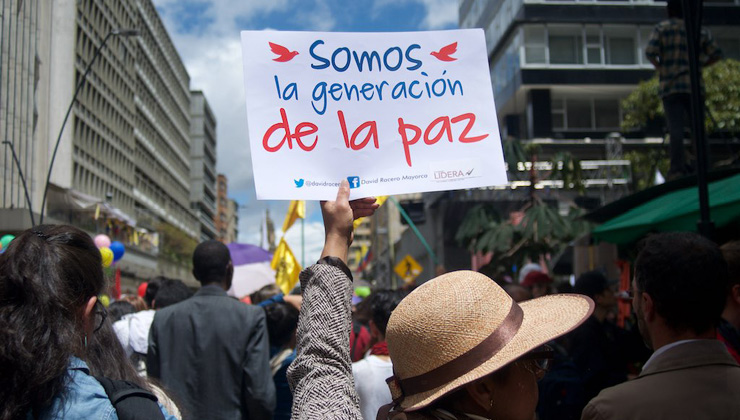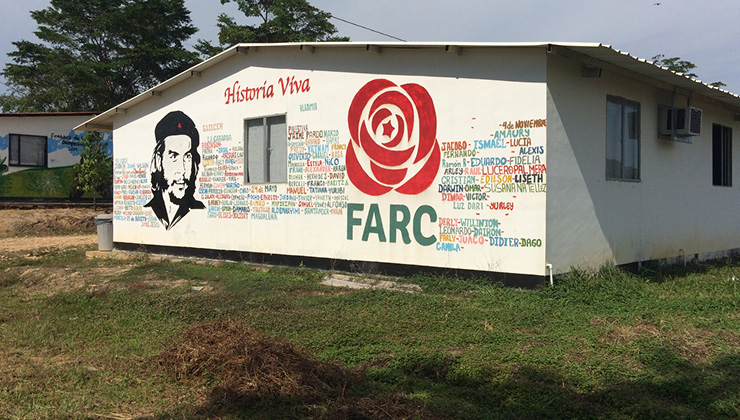Julia Zulver, Sanne Weber, and Juan Masullo discuss how with the new negotiations, the Government of Colombia will have a unique opportunity to put its money where its mouth is when it comes to meaningfully including women in all stages of peace negotiations and implementation.
On 21 November, the Government of Colombia and the Ejército Nacional de Liberación (ELN) guerrillas formally began peace talks, which they hope will bring an end to nearly six decades of war. The dialogues were initiated in the outskirts Caracas, Venezuela, but will likely rotate between Cuba, Norway, and Venezuela.
There are officially six points on the agenda, which will be discussed over the coming months: civil society participation in peacebuilding, democracy for peace, transformations for peace, victims of the conflict, the end of the armed struggle, and the implementation of the peace accords.
These negotiations are of crucial importance to Petro and Marquez’ new government. Not only was reaching a peace deal with the ELN central to their campaign promises, but it also signals that a move to the left has concrete implications for peace in the country, particularly after the former government shut down previous peace talks in 2019.
As negotiations begin again, women’s meaningful participation will be fundamental to the lasting success of any peace deal. And given the vision for political and economic transformation – as evidenced in the first three points of the agenda – these negotiations offer a new chance to create a society with more equality for women and other oppressed groups.
Women’s Participation in Peace Negotiations is Important
Studies show that women’s participation in peace negotiations contributes to the quality and durability of peace in years to follow. Other research shows that peace agreements have the potential to “generate shifts in societal norms and practices”, and can be used to strengthen women’s rights after war when their contents are gender-inclusive.
And indeed, Colombia’s 2016 Final Accord to end the conflict between the FARC and the Government is heralded as being the most gender inclusive in history.
A closer look at the history of the negotiations, however, reveals how hard women had to fight to be included. The Gender Subcommission – a body designed to include a gender perspective – was only created in 2014, a full two years after the start of the negotiations with the FARC. What’s more, it was only created after strong lobbying from Colombia’s women’s movement and female FARC members, to compensate for the nearly all-male negotiation team.
Moreover, when the deal was submitted to the public for approval through a plebiscite, outspoken conservative groups strongly resisted the so-called ‘gender ideology’ that was allegedly included in the agreement. As a result, the final peace agreement was watered down. Mentions of LGBTQ rights were reduced, while the gender perspective remained mostly limited to mentions to ‘women’ and ‘sexual violence against women’.
A debt to Colombia’s women
These weaknesses become further apparent when looking at the implementation of the peace agreement, where the provisions related to gender have not been prioritised. Most of the attention has so far focused on creating policy frameworks and institutions, for example, the ‘High-Level Agency for Gender’. But the mandate is often vague, the budget low, and the actual changes to women’s lives remain few.
At the same time, civil society organisations identify that actions with a ‘gender perspective’ – especially those centred on rural women – tend to focus on providing handouts, and sometimes even reinforce women’s traditional gender roles. This means that they target a temporary alleviation of poverty, without aiming for more structural issues like land reform and political and economic empowerment. Actual changes in women’s access to opportunities further require transforming assumptions around gender roles, which necessarily means involving men and boys.
Another example of the agreement’s shortcomings is related to the reincorporation of the FARC guerrillas. While initially there was strong attention paid to gender within the DDR program, five years on, most of the productive and political projects run by former guerrillas are led by men, leaving women feeling discouraged. This is due in part to the so-called baby boom among the demobilised guerillas, which led many farianas (FARC women) to focus on raising their children.
Moreover, women engaging in peacebuilding efforts around the country have reported intensifying threats and violent attacks as they undertake their community activism. Dr. Zulver’s new book – High-Risk Feminism in Colombia – documents how women who make demands for women’s rights are seen as transgressive, and face backlash from armed groups who want to silence them.
Why a gender lens matters in the ELN negotiations
The peace agreement with the FARC created an era of hope, particularly for the country’s women. Yet the past five years have brought disappointment and disillusion for many, as the gender focus has not been implemented in practice, despite ongoing reminders that women are key to peace in Colombia.
Since the negotiations with the ELN stopped under the Duque government, the guerrillas have shown that they have the capacity to paralyse large portions of the country via armed blockades, attacks to the country’s infrastructure, and fiercely fighting other armed groups – including FARC dissidents and the national army and police – to amass more territory.
Moreover, the number of civilians killed in ELN-related events has recently increased; in October alone, two civilians were killed and about 8,000 were confined for days due to attacks involving the ELN.
Yet the new government might offer the possibility of a new future. Petro and Marquez campaigned on a platform that promised to actually implement the 2016 deal. Importantly, the government has promised to rule with an explicit gender lens, which means that rural women’s issues should be at the forefront of its policymaking and programming. How the impending negotiations include a gender focus will be a litmus test for the new government’s ability to make good on promises to bring real peace to the country’s women.
The recently appointed negotiation team includes several women. That women participate from the beginning of the negotiations is a good sign.
Among these women, central to the government’s negotiation team is María José Pizzaro, an artist, activist for peace and historical memory, and senator in the progressive Historic Pact coalition. Her inclusion in the team brings hope for both women and peace, as she is deeply committed to the idea that “women will be the face of Latin America’s progressive politics!”. Her dedication to peace is linked to the memory of her father, a commander of the demobilized M-19 guerrilla group, who was a central figure in the peace deal reached with the government in the 1980s before his assassination.
There is also good reason to believe that civil society participation will indeed be prioritised, particularly given the importance of including marginalised groups in the earlier round of negotiations and the explicit centrality given to civil society participation in the first point of the agenda.
Nevertheless, beyond the participation of women and other marginalised groups, more is needed to create a peace that is truly meaningful for women and for transforming inequality. In order to prevent the shortcomings of the 2016 process, and based on research on conflict and gender, we deem it crucial that:
- From the beginning, women from both parties are involved in all stages of the negotiations, subsequent policymaking, implementation, and monitoring of the peace deal.
- ‘Mentions of ‘gender’ go beyond surface level programming. Offering women equal opportunities will require changing a system that structurally discriminates against them. This not only means providing isolated projects or support for women, but will require sensitisation and training with women and men to change gender roles and stereotypes.
- The specific protection needs –and risk factors –of women politicians, negotiators, and peacebuilders are recognised and guaranteed throughout the entire process, are explicitly addressed in the agreement, and are upheld throughout post-conflict reconstruction.
The views, thoughts and opinions expressed in this blog post are those of the author(s) only, and do not necessarily reflect LSE’s or those of the LSE Centre for Women, Peace and Security.
Image credit: ACDI / Katalina Morales (CC BY-NC-ND 2.0)





Excellent analysis and the evidence exists that including women in peace negotiations strengthens the process, the product and the outcome.